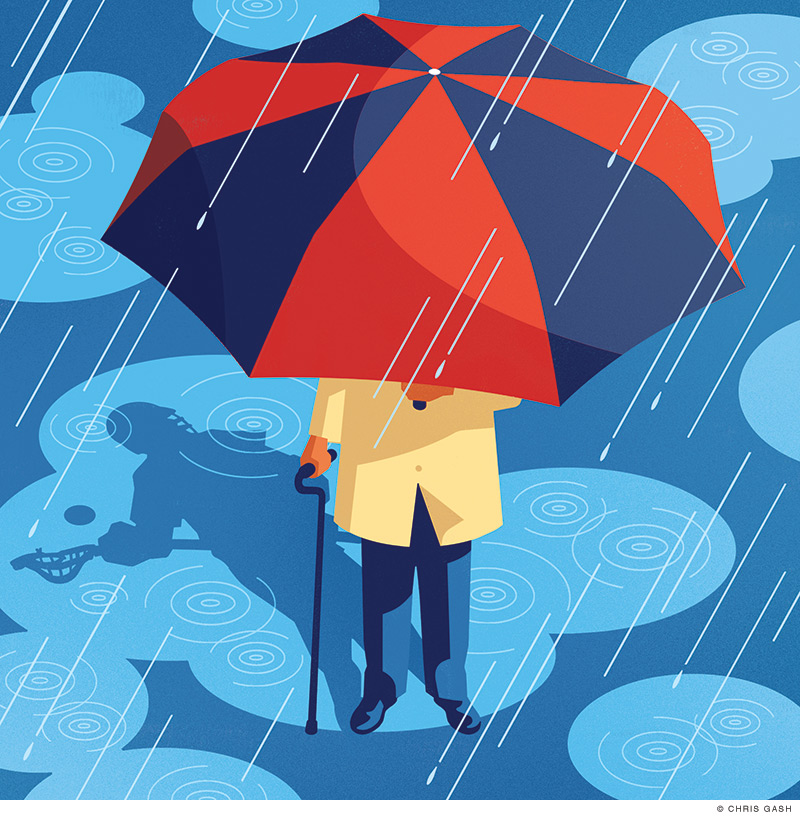
For nearly four years I have walked with a third limb. I wish it were a British affectation.
By Howard Freedlander
As my 55th reunion class assembled alongside even older cohorts near the Ben on the Bench statue for the 2022 Alumni Weekend parade, a heavy rain was falling. No one seemed to care. Good cheer permeated the senior-citizen participants. I joined the constant chatter and laughter, but was nagged by a bothersome doubt: Would my cane be enough to help me navigate Locust Walk’s slippery surfaces without stumbling?
For nearly four years I have walked with a third limb. I wish it were a British affectation, a device to gain empathy. But no. It was dizziness and balance problems that brought me to the use of a stick. A fall in a restaurant, which prompted what I regarded as altogether too much attention from paramedics, culminated in an ambulance ride to a nearby hospital. Thus began a nine-month search for answers—punctuated by two more tumbles that filled me with anxiety.
Deciding that good sense required use of a protective staff, I bought one from a company called Fashionable Canes. The jaunty name does not hide the humbling need for a stick. It just disguises it with marketing tactics designed to appeal to vulnerable, vain people like me. Frequent promotional emails display fancy canes and showy handles. Make what you will out of my determined eschewal of their more ornate offerings. I move smartly with my simple but elegant wooden helper. I fancy myself no normal cane user; I am proud and determined. (My wife might use a different word.)
That may explain why, for all the years I’ve attended Penn reunions, I’ve always summarily dismissed the option to use a golf cart to travel the alumni parade route. And the approach of number 55 changed nothing in my attitude. Indeed I remained a bit contemptuous, arrogantly so, of this mode of transportation. I was no weakling. I was still tough, behind my otherwise gentle bearing.
The rainy 2022 alumni parade found me in full possession of this misplaced self-esteem. There would be no motorized transport for this former lacrosse player who prided himself on his scrappiness, his willingness—silly in retrospect—to play injured. There was just too much history at stake. My high school coach, Joe Brune, had been a former Marine. I could not let him down, even in absentia.
The upstanding Mr. Brune had some odd concepts about life. When a teammate hurt his leg on a steel grate on our practice field, he said, “A man who plays with one broken leg isn’t half the man who plays with two broken legs.” My impressionable teenage self may have found his philosophy humorous—but dared not to laugh. When another teammate explained his lateness due to a medical appointment, our erudite leader declaimed: “Old ladies go to doctors. You see me first.” Though I liked my coach, I feared him too. And there are some shadows you can’t outrun.
So the cane alone would be my concession to reality during a slippery parade. Mind you, I happily withheld any judgment of fellow senior citizens in the Class of 1967. They opted for comfort and safety. They did not hear a long-ago coach whispering in their ears: ignore pain, play on. They listened to the call of their bodies—and maybe their spouses.
What am I to make of these irrational inspirations? Even as I heed their mandates, I find them strange, unexplainable. A high school lacrosse coach who spouted ridiculous koans about physical toughness still has a senseless influence on me. I should know better. I do know better. And yet I still get suckered into trying to please him.
Maybe ex-jocks like to delude themselves into thinking they still retain the ability to withstand pain. How pleased I felt with myself, seven years ago, when a well-meaning nurse at Johns Hopkins Hospital offered me oxycodone shortly after prostate cancer surgery—and I declined in favor of extra-strength Tylenol. Though hurting from this prototypically male cancer, I could not escape the stubborn resolve to play through pain. I yearned not for relief, but for bragging rights.
As a 77-year-old whose days as a Penn athlete are forever gone, left languishing on River Fields, I continue to act in ways that defy logic. My common sense should take precedence. But misguided masculinity and pride still occupy the driver’s seat. Instead of listening to saner sources of wisdom, such as wives and middle-aged daughters, I continue to hark back to the inanities of a former Marine whose teenage charges hoped to impress him with conspicuous disregard for their own bodies.
I should laugh at myself. And I do. But not enough. Standing on 37th Street as rain-soaked men and women in their late 70s awaited the annual parade of classes, I clutched my cane, called forth my inner toughness (stupidity?), ignored the carts and friendly drivers, and moved out quickly with my classmates.
But I really must conquer this demon that has so long driven me. Yes, my cane provides a ready sense of security. But so does the arm of one of my daughters as I climb down rail-less steps in the dark, or a female nurse as I gingerly disembark from an exam-room table. I am trying now to subject my concept of toughness and pride to a dosage of wisdom. Excessive masculinity is a persistent irritant. It spurs unwise decisions. A cure is elusive.
But I have a new goal for my 60th Reunion. Confident that I will be present in Ben Franklin’s esteemed academic village, I will gladly call a cart if necessary and overcome any embarrassment. I will accept my longevity. I will not depend solely on my fashionable cane and unwise determination. I will listen to my wise wife, not the distant and delusional words of a lacrosse coach.
Manhood demands moderation. Even belatedly.
Howard Freedlander C’67 last wrote for the Gazette in 2012.

